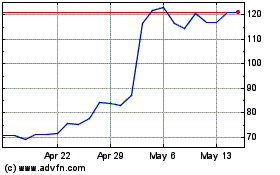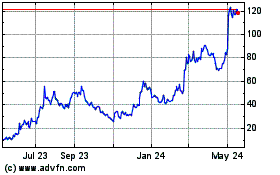Carvana Co. (NYSE: CVNA), the leading e-commerce platform for
buying and selling used cars, presented today at the William Blair
44th Annual Growth Stock Conference, sharing progress and updates,
including:
Operating Plan One year ago, Carvana launched an internal
plan that identified opportunities to strengthen unit economics
over a 12-month period. This effort drove progress across every
team, resulting in:
- Efficiency-driven growth. Despite continued focus on
profitability initiatives and unit economics, Carvana grew retail
units by 16% YoY in Q1, driven in part by improvements in
conversion and customer experience.
- Substantial YoY improvements in unit economics. In Q1,
non-GAAP GPU increased 42%, non-GAAP SG&A per unit decreased
17%, and Adjusted EBITDA Margin increased 860 bps.
- Industry-leading Adjusted EBITDA margin. In Q1, Carvana
delivered its best financial results in company history, driving
industry-leading 7.7% Adjusted EBITDA margin and reaching its goal
of becoming the most profitable auto retailer for the first time by
this measure.
- Significant cash flow progress. Adjusted EBITDA in Q1
was $235 million while capital expenditures and non-PIK interest
expense was only $48 million.
- Further momentum in Q2. The company reiterated its
expectation of a sequential increase in its YoY growth rate in
retail units and a sequential increase in Adjusted EBITDA in
Q2.
Carvana is now rolling out its next 12-month plan, including
setting new, ambitious targets for each of its teams with the goal
of driving additional material gains across every component of the
business.
Capital Structure Carvana’s strong Adjusted EBITDA
provides significant financial flexibility that allows the company
to de-lever over time. The company previously announced its
intention to pay cash interest on 2028 and 2030 Senior Secured
Notes for interest payments beginning in 2025. In Q2, Carvana
repurchased $250 million (or ~24%) of 2028 Senior Secured Notes and
raised $350 million of equity capital through its at-the-market
(ATM) program.
Carvana expects these combined actions to lead to ~$55 million
of interest expense savings in 2026 and $620 million less debt
outstanding at year-end 2026. Beyond these steps, the company plans
to continue to reduce leverage over time.
Carvana’s full presentation can be found by accessing the events
and presentations page of the company’s Investor Relations
website.
Forward-Looking
Statements.
This press release contains forward-looking statements within
the meaning of the Private Securities Litigation Reform Act of
1995. These forward-looking statements reflect Carvana’s current
expectations and projections with respect to, among other things,
its financial condition, results of operations and future
performance. These statements may be preceded by, followed by or
include the words “aim,” “anticipate,” “believe,” “estimate,”
“expect,” “forecast,” “intend,” “likely,” “outlook,” “plan,”
“potential,” “project,” “projection,” “seek,” “can,” “could,”
“may,” “should,” “would,” “will,” the negatives thereof and other
words and terms of similar meaning.
Forward-looking statements include all statements that are not
historical facts, including expectations regarding forecasted
results and financial and operational goals. Such forward-looking
statements are subject to various risks and uncertainties.
Accordingly, there are or will be important factors that could
cause actual outcomes or results to differ materially from those
indicated in these statements. Among these factors are risks
related to: the larger automotive ecosystem, including consumer
demand, global supply chain challenges, and other macroeconomic
issues; our substantial indebtedness; our history of losses and
ability to maintain profitability in the future; the seasonal and
other fluctuations in our quarterly operating results; the highly
competitive industry in which we participate; the changes in prices
of new and used vehicles; and the other risks identified under the
“Risk Factors” section in our Annual Report on Form 10-K for the
fiscal year ended December 31, 2023.
There is no assurance that any forward-looking statements will
materialize. You are cautioned not to place undue reliance on
forward-looking statements, which reflect expectations only as of
this date. Carvana does not undertake any obligation to publicly
update or review any forward-looking statement, whether as a result
of new information, future developments, or otherwise.
Use of Non-GAAP Financial
Measures
To supplement the consolidated financial measures, which are
prepared and presented in accordance with GAAP, we also refer to
the following Non-GAAP measures in this press release: Adjusted
EBITDA, Adjusted EBITDA Margin, Gross Profit, non-GAAP, Total gross
profit per retail unit, non-GAAP, SG&A Expenses, non-GAAP, and
Total SG&A expenses per retail unit, non-GAAP.
Adjusted EBITDA is defined as net income (loss) plus income tax
provision (benefit), interest expense, other operating expense
(income), net, other expense (income), net, depreciation and
amortization expense in cost of sales and SG&A, goodwill
impairment, share-based compensation expense in cost of sales and
SG&A, and restructuring expense in cost of sales and SG&A
expenses, minus revenue related to our Root Warrants and gain on
debt extinguishment.
Gross profit, non-GAAP is defined as GAAP gross profit plus
depreciation and amortization expense in cost of sales, share-based
compensation expense in cost of sales, and restructuring expense in
cost of sales, minus revenue related to our Root Warrants. Total
gross profit per retail unit, non-GAAP is Gross profit, non-GAAP
divided by retail vehicle unit sales.
SG&A expenses, non-GAAP is defined as GAAP SG&A expenses
minus depreciation and amortization expense in SG&A expenses,
share-based compensation expense in SG&A expenses, and
restructuring expense in SG&A expenses. Total SG&A expenses
per retail unit, non-GAAP is SG&A expenses, non-GAAP divided by
retail vehicle unit sales.
We believe that this metric is useful to us and to our investors
because it excludes certain financial, capital structure, and
non-cash items that we do not believe directly reflect our core
operations and may not be indicative of our recurring operations,
in part because they may vary widely across time and within our
industry independent of the performance of our core operations. We
believe that excluding these items enables us to more effectively
evaluate our performance period-over-period and relative to our
competitors.
For the Three Months Ended (dollars in millions, except
per unit amounts) Mar 31, 2023 Mar 31, 2024 Net
income (loss)
$
(286
)
$
49
Income tax benefit
(2
)
(1
)
Other income, net
(3
)
(87
)
Interest expense
159
173
Operating income (loss)
(132
)
134
Other operating expense, net
1
1
Depreciation and amortization expense in cost of sales
44
39
Depreciation and amortization expense in SG&A expenses
49
43
Share-based compensation expense in SG&A expenses
15
23
Root warrant revenue
(5
)
(5
)
Restructuring expense
4
-
Adjusted EBITDA
$
(24
)
$
235
Total revenues
$
2,606
$
3,061
Net income (loss) margin ¹
-11.0
%
1.6
%
Adjusted EBITDA margin
-0.9
%
7.7
%
Gross profit
$
341
$
591
Depreciation and amortization expense in cost of sales
44
39
Root warrant revenue
(5
)
(5
)
Gross profit, non-GAAP
$
380
$
625
Retail vehicle unit sales
79,240
91,878
Total gross profit per retail unit ²
$
4,303
$
6,432
Total gross profit per retail unit, non-GAAP
$
4,796
$
6,802
SG&A expenses
$
472
$
456
Depreciation and amortization expense in SG&A expenses
49
43
Share-based compensation expense in SG&A expenses
15
23
Restructuring expense in SG&A expenses
4
-
SG&A expenses, non-GAAP
$
404
$
390
Retail vehicle unit sales
79,240
91,878
Total SG&A expenses per retail unit ³
$
5,957
$
4,963
Total SG&A expenses per retail unit, non-GAAP
$
5,098
$
4,245
¹ In Q1 2024, Net income (loss) margin increased by 1,260 bps YoY ²
In Q1 2024, GPU increased 49% YoY ³ In Q1 2024, SG&A per unit
decreased 17% YoY
About Carvana
Carvana’s mission is to change the way people buy and sell cars.
Over the past decade, Carvana has revolutionized automotive retail
and delighted millions of customers with an offering that is fun,
fast, and fair. With Carvana, customers can choose from tens of
thousands of vehicles, get financing, trade-in, and complete a
purchase entirely online with the convenience of home delivery or
local pick up in over 300 U.S. markets. Carvana’s vertically
integrated platform is powered by its passionate team, unique
national infrastructure, and purpose-built technology. Carvana is a
Fortune 500 company and is proud to be recognized by Forbes as one
of America’s Best Employers.
For more information, please visit www.carvana.com.
View source
version on businesswire.com: https://www.businesswire.com/news/home/20240606129576/en/
Investors Mike McKeever Investors@carvana.com
Media press@carvana.com
Carvana (NYSE:CVNA)
Historical Stock Chart
From May 2024 to Jun 2024

Carvana (NYSE:CVNA)
Historical Stock Chart
From Jun 2023 to Jun 2024
